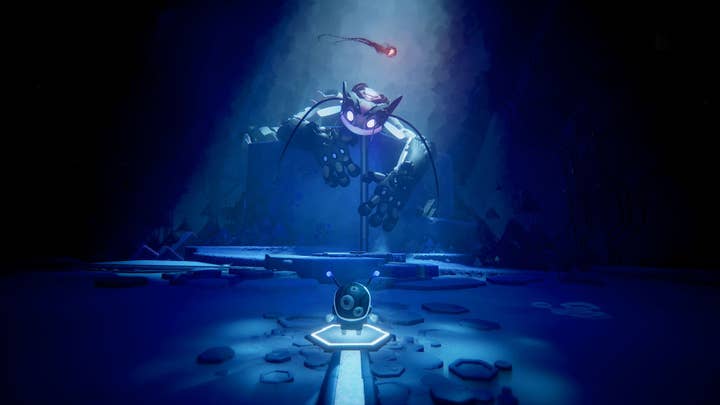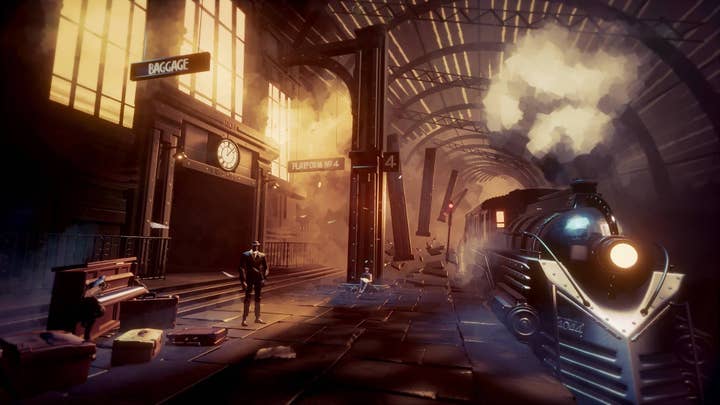Dreams: Critical Consensus
Media Molecule dives deeper into its Play, Create, Share concept, and the critics salute a monumental achievement
The release of Dreams has sparked existential dread in a great many of the critics tasked with its appraisal.
Is it a 'game'? Can you even 'play' it? Would it be better to come back to it in five years before deciding where on the ten-point scale it should land? Just the who the hell do those clever people at Media Molecule think they are, anyway? One prominent website hired an actual game developer to write its review (more on that later), and even that article is underpinned by the nagging sense that 1200 words and 50 hours is a poor response to a product of such bounteous potential and startling complexity.
Everyone agrees on one thing, however; with Dreams, Media Molecule has arrived at the ne plus ultra of its Play, Create, Share concept -- a suite of tools so rich and diverse that it can produce not just entire games, but estimable works in an array of artistic fields. It is the product of ten years of labour on Media Molecule's part, and the UK studio has described plans that stretch out for another ten years into the future. Whether Dreams is a game, an engine, or a platform for creativity like YouTube, the ambition behind it is quite unlike anything that this industry has produced.
"Most adults will need dozens of hours to properly get to grips with the game's complicated web of options"
The Independent
This is at the heart of The Independent's review, in which Louis Chilton describes Dreams as "a game that aims stratospherically high -- and risks shooting over the heads of its audience completely." This has always been the tension at the heart of Media Molecule's stated goal; in trying to create such powerful tools, it would lose the accessibility that would keep them democratic. While there will inevitably be Dreams users who are more skilled than others, it needs to be an attractive enough package to enough people to justify the enormous investment of time and resources.
"Like LittleBigPlanet, Dreams employs a whimsical, almost ASMR-like voiceover that seems to speak to the younger sections of its audience, easing you through the beginning of the game and gently explaining the control scheme," Chilton writes. "The warmly condescending tone starts to feel a bit out of place, however, when you start to grasp the full complexity of the game's creation mechanics.
"The creative options grant you incredible control over everything from characters, sounds and environments to control schemes and in-game physics. Most adults will need dozens of hours to properly get to grips with the game's complicated web of options; I can only imagine the tremendous amount of time and frustration it would have taken my nine-year-old self to do the same, no matter how soothing the voiceover was."

If Media Molecule intended people as young as nine to engage with LittleBigPlanet, it seems likely that Dreams will skew a little older in terms of its core audience. Game Informer's Jeff Marchiafava admits he was one of many players who spent "hours tinkering with LittleBigPlanet's editors but never published a single level." With that in mind, he assumed that his experience of Dreams would be some light experimentation with its tools, and then the majority of his time spent "surfing" the creations of other users.
"Instead, the reality has been the reverse, my skepticism replaced by continual astonishment at the possibilities Dreams offers," Marchiafava writes.
"I can't overstate how smartly designed everything is, and it makes the creation process feel like experimental play"
Game Informer
"Foundational controls make sculpting and moving objects in 3D space a breeze, a visual programming language eases novices into computer logic, and a streamlined interface lets you hop between editing and playing prototypes instantaneously. You still need to devote several sessions to learning the ropes from Media Molecule's video tutorials, but I can't overstate how smartly designed everything is, and it makes the creation process feel less like work and more like experimental play.
"Not only can anyone piece together a prototype out of primitive shapes, they can also make it beautiful with Dreams' groundbreaking art tools. Much of the magic lies in Flecks, small artistic brush strokes applied to the surface of every object that result in the game's evocative, dream-like aesthetic. These Flecks can be colored, unraveled, and animated as you see fit, and can turn a simple hemisphere into a lush, grassy knoll in seconds.
"If you've ever felt the frustrating sting of having a drawing fail to live up to your imagination, Dreams delivers the opposite sensation - I've routinely been surprised by how much better my creations turn out than I expected. Every facet of Dreams, from sculpting to painting to the application of animations and effects, features this same ease of use."
Not every critic took to Dreams' tools with the same ease, but the vast majority are full of praise for how adeptly Media Molecule have streamlined and simplified so many of its creative processes. Marchiafava highlights a need for better guidance on "the more advanced gadgets and variables," as well as some lessons on game design, to empower users to tackle unique creations, and rely less on mimicry of existing ideas.
Indeed, after a year in a bespoke form of Early Access, Dreams' store of user-generated content is already overflowing with clones and tributes. Anyone who buys the 'finished' game -- an odd term to apply to a product with such a busy and varied roadmap of features and additions still to come -- will almost certainly get their money's worth by simply "Dream Surfing" the work of others. However, as Push Square's Stephen Tailby highlights in an awestruck review, you can do more than simply play with the abundance of content that already exists.
"Frankly, the variety -- and quality -- of what's been made by the community so far is mind-boggling"
Push Square
"When someone publishes something to the Dreamiverse, it becomes available for all to enjoy, but they can also choose to make it available for all to utilise as well. Say you need a lamppost to fill in the town you're making. You could always make your own, but odds are someone has already made a perfectly good lamppost. Finding and using other people's stuff is an absolute breeze, and means you can quickly cobble together something that looks good in a few minutes. It's a self-expanding treasure trove of user-generated assets that's brilliant for beginners.
Tailby continues: "Frankly, the variety -- and quality -- of what's been made by the community so far is mind-boggling. Be it highly detailed sculptures or well realised interactive experiences, there's a near endless sea of creations to explore. While we've been surprised at the level people have reached already, not everything will be of such a standard. But this is par for the course with user-generated content, and the quality isn't really the point; Dreams is a new medium through which people can express themselves. Sure, some stuff probably isn't worth your time as a player, but everyone has to start somewhere."

It is, of course, inevitable that Dreams will only reveal its true face to those that take the time to seek it out. Several reviews commend Media Molecule for its efforts to curate and present the user-generated content it already has, and there will be a great deal more on the way now that Dreams has been officially released. For some, surfing the creativity of others will be the sum total of their experience, and that will likely be enough. For others, a future awaits where Media Molecule wants to explore publishing content made in Dreams to other platforms, and allowing creators to sell their work.
"There are games that you can create in Dreams that are as fun and polished as something you'd pay for"
IGN
Whether Dreams is that good is an open question, and one that most reviewers lack the experience to effectively answer. Fortunately, IGN thought ahead and brought in Jodie Azhar, CEO and founder of Teazelcat Games, to offer a developer's eye view on what Media Molecule has achieved. What Azhar has to say needs to be read in full, but it's clear that Dreams comes extremely close to matching the expressive power of a full-featured game engine.
"Platformers, puzzle games, experimental games, emotive experiences, graphic adventures, and simple shooters can all be made with this toolkit," she says. "Basically, if you can break your game down into smallish levels then Dreams is a wonderful game engine to use, and is probably a lot faster to set up something that's playable and looks very good than using a traditional game engine and lots of different asset creation software."
There is a vitality to Dreams that feels necessary for the games industry in 2020, Azhar says. It offers a set of tools that approach the intuition of using a pen to write, a pencil to draw, or a camera to take a photo, and does that for all of the various disciplines needed to make a game.
"Until Dreams it's felt like there hasn't been a tool that allows you to create all the necessary elements in one piece of software. Sure, there are free game engines online, and Dreams isn't the first game that lets you create a game level or animation. But it's the easiest and [a] fun transition between having a love of games and trying to make one yourself. Because it's like having an entire toy box at your disposal.
"If you're looking to make a game that requires the storage of a lot of data, display lots of animatable characters at once, or you want to have a high level of granular control, then Dreams probably isn't going to be sufficient. But there are absolutely games that you can create in Dreams that are as fun and polished as something you'd pay for. I'm sure that we'll see remarkable games from casual players, hobbyists and professional game developers alike."
Mission accomplished, Media Molecule. Here's to the next ten years.







.jpg?width=291&height=164&fit=crop&quality=80&format=jpg&auto=webp)

